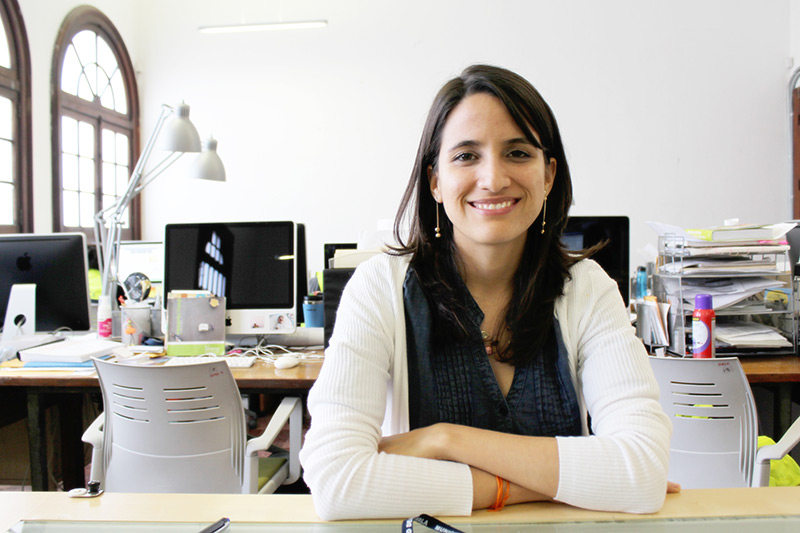Through this series of short interviews with former students of our masters course, we aim to trace their career paths since graduating and offer a glimpse of their current experiences working in the areas of architecture, urban planning and development.

Silvia at her office in Guatemala City ©Werner Solórzano
In this interview, Silvia Aldana, a Mundus Urbano student from Darmstadt who completed her second year with us in Barcelona, tells about her work creating affordable housing back in her hometown: Guatemala City.
Name: Silvia Aldana
Age: 28
Nationality: Guatemala
Class of: 2012
Occupation: Architect and urban planner / Housing General Coordinator at the Housing and Urban Development Metropolitan Agency
Location: Guatemala City
Area of interest/specialty: Affordable housing, sustainable urban development
Life goal: To live an honest, happy life…and to always have enough time and resources to travel and read
Professional goal: To contribute to achieve a fairer world through my work
1. What have you been working on since graduating from the masters program?
I have been working for a local government agency that is promoting a new housing and urban development strategy that seeks to provide affordable housing to every citizen, especially to those most vulnerable. The kind of housing it promotes is productive housing, inserted in the city, close to sources of employment/production and services, and well-connected by public transportation. It works on a cross-subsidy financial mechanism so there are market initiatives (aimed at a specific population: lower-middle to middle income families-) that subsidize social interest initiatives.
2. How/when did you become interested in development issues in the first place?
Previous to the master I worked supervising the construction of basic infrastructure like schools in rural areas. Construction of these buildings were meant to improve these communities but usually, these communities lacked teachers and proper equipment to function, and so I understood that buildings in themselves did not ensure development unless they were inserted within comprehensive development plans, with clear strategies and effective tools and resources to implement them.
3. What does your current job/project entail? Describe a regular work day.
I coordinate operations for the housing projects at the agency, which means that after a project is identified and framed within the municipal strategy by the assistant director, I plan and manage the design, social, financial and land management components at a proposal level, which is later taken to negotiation with other municipality departments, institutions and organized groups of beneficiaries. I have an amazing team and my boss does a great job of leading us, so at the end of the day it is a very collaborative work.
4. In what ways do you feel the master prepared you for the work you are doing now?
Many of the case studies from the course and the internship have served as a reference for the problems we face at the agency. I have also gone back to my notes and bibliography to support my arguments. Team work and working with people from different backgrounds has been very helpful in reaching the best outcomes of the working sessions that I coordinate and participate in in my current job. Learning how to express the results of team or individual work, whether written or spoken, was also a good exercise.
5. In your experience so far, what do you see as the major obstacles to sustainable urban development? What about progresses?
In Guatemala City, land management still represents a great obstacle, one that if overcome, could even solve the financial issues faced by the city government to strengthen the housing and urban development strategy. The major progress my city has experienced is the introduction of planning tools that are -slowly but increasingly- having an effect on the way the city is developed, providing the city with resources to serve all the citizens and especially those most vulnerable. It is still a very early stage on the road to a fair development but it is a good prospective.

Silvia with the children of the housing cooperative ©Werner Solórzano
6. Tell us about your most memorable working experience so far.
It would have to be working with the housing cooperative. The cooperative is formed by beneficiaries of the social programs of the Municipality. They are low-income families that have been working together for 7 months now, to constitute the first housing cooperative in Guatemala City that follows the model of self-management, solidarity and collective property (this last component secures vulnerable populations from losing their house to economic crisis or gentrification, for example). As the City’s -and the Agency’s- first, the cooperative has been a great challenge, one from which I have personally learned a lot and also experienced all sorts of difficult, sad, scary and crazy moments at some point. However, this project has allowed me to learn from other Latin American experiences based on that model and to see for myself how even after many years of work, strong will and hard-working people have made their seemingly impossible dream of a house come true, which makes me hopeful that the cooperative in Guatemala will get there too. We are a part of that process, working with other institutions to help them get there faster and in the best conditions possible. Now, the cooperative is stronger, ready to legalize and start its participatory design process within a relatively short time and in that sense, the happy, inspiring and fulfilling moments surpass by miles those of uncertainty and difficulty.
7. What is your dream job?
At this moment, this one makes me very happy, eager to learn more and be better at what I do.


Hi! My name is Pedro, i am brazilian. I am university teacher and working with social housing. I would like to talk with Silvia about her work and try make some partnership. Thanks!